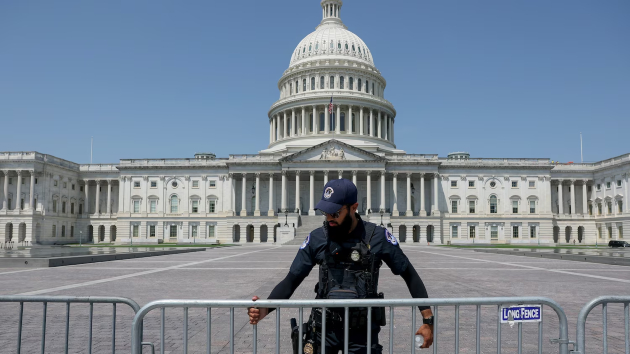
(WASHINGTON) — With the Fourth of July just days away, law enforcement and federal officials are on guard about Iranian retaliation in the United States, despite officials saying there are no specific, credible threats at this time.
This comes after the U.S. military’s strikes on three Iranian nuclear facilities by B-2 stealth bombers and Tomahawk cruise missiles.
“We would be foolish to assume that they’re not plotting revenge even if we can’t see it right now. It will come, and we need to maintain vigilance because if we don’t, they will use the element of surprise to their advantage and cause harm,” said Elizabeth Neumann, a former Department of Homeland Security assistant secretary for counterterrorism during the first Trump administration.
Even before Saturday’s bombing mission in Iran, the U.S. was at a heightened level of security after a string of high-profile terrorist attacks occurred across the country in the first six month of 2025 — including a deadly truck ramming rampage in New Orleans on New Year’s Day and a June 1 Molotov cocktail attack in Boulder, Colorado.
The wave of extremist violence has come against a backdrop of a rising number of assaults, vandalism and harassment nationwide linked to the Israel-Hamas war.
In the wake of the U.S. mission to cripple Iran’s ambitions to develop a nuclear weapon, Iran’s supreme leader, Ali Khamenei, released a message on social media saying, “We will not surrender.” Iran’s Foreign Minister Abbas Araghchi threatened in a speech that his country will seek revenge that will have “everlasting consequences” and accused the United States of committing “dangerous, lawless and criminal behavior.”
“In accordance with the U.N. Charter and its provisions allowing a legitimate response in self-defense, Iran reserves all options to defend its sovereignty, interests, and people,” Araghchi said.
On Monday, Iran carried out a missile attack on the United States’ Al Udeid Air Base in Qatar. U.S. Central Command said both U.S. and Qatari forces “successfully defended” against the attack and that no casualties were reported.
Later in the day, President Donald Trump announced that a ceasefire had been agreed upon between Israel and Iran, but tensions remained high into Wednesday.
‘A long memory’
In reponse to the U.S. attack on Iran’s nuclear apparatus, the Department of Homeland Security (DHS) issued a nationwide bulletin, saying the ongoing conflict is “causing a heightened threat environment in the United States” and warning that “low-level cyber-attacks against US networks by pro-Iranian hacktivists are likely, and cyber actors affiliated with the Iranian government may conduct against US networks.”
Neumann, an ABC News contributor, said Iran’s initial response to the U.S. bombing of three of its nuclear facilities is similar to what the country did following the Jan. 3, 2020, U.S. strike in Baghdad, Iraq, that killed Gen. Qassem Soleimani, leader of Iran’s elite Quds Forces.
Five days after Soleimani’s death, Iran’s Islamic Revolutionary Guard launched a ballistic missile attack on the U.S. Al Asad airbase in western Iraq. The attack left over 100 U.S. service members with traumatic brain injuries, according to the Pentagon.
“We were definitely very concerned about the potential for something to happen in the homeland,” said Neumann, who was working in the DHS under the first Trump administration when Soleimani was killed.
Neumann said the DHS’s Iran specialists assumed Iran would activate sleeper cells possibly in the United States and that Hezbollah, the Iran-backed Shiite militia group, would launch terrorist attacks against U.S. interest.
But Neumann said Iran’s attack on the Al Asad airbase was used by Iran to appease its domestic audience by publicly displaying pictures of the attack to give the impression they were pushing back against the United States.
“Since they mostly control the airwaves in Iran, they can kind of get away with it. They don’t actually have to do a major military strike and hurt us the way that we’ve hurt them because they can just kind of manufacture the story that they want for their domestic audience,” Neumann said.
Neumann recalled that at the time, the DHS rapidly prepared an assessment of what Soleimani’s assassination could mean for the United States and released a bulletin similar to the one DHS put out this week. But after the attack on the Al Asad airbase, Iran’s response quieted down.
“The Iranian regime … has a long memory and they recognize that they do not have the strength right now to get back at us,” Neumann said. “But they will wait and they will look for opportunities to cause harm.”
She noted that in August 2022, the U.S. Department of Justice announced that a member of the Islamic Revolutionary Guard attempted to pay an individual $300,000 to kill John Bolton, the National Security Advisor during Trump’s first term, saying it was likely in retaliation for Soleimani’s death.
In November 2024, the Department of Justice announced that three people, including one described as an “asset” of the Islamic Revolutionary Guard, were charged in Iran-linked murder plots, with one of them accused of trying to assassinate then-President-elect Trump to avenge the killing of Soleimani.
Iran could turn to ‘crude or escalatory tactics’ employing proxies
A threat assessment by the Center for Internet Security that was released after the U.S. bombing of Iran’s nuclear facilities, said, “Tehran is likely to leverage a combination of direct, proxy, and irregular/inspired forces to conduct physical, cyber, or terrorist attacks against US interests both at home and aboard.”
“In light of Israeli strikes and the degradation of the Iranian proxy network in the Middle East, Iran will likely seek to re-establish deterrence against its adversaries, potentially relying on crude or escalatory tactics and informal networks,” according to the assessment. “US interests — particularly Embassies and military bases overseas — are likely to be targeted, and it is possible that Tehran will order or encourage attacks on the US government institutions, businesses, critical infrastructure, or civilians.”
Since the Oct. 7, 2023, widespread surprise attack on Israel by Hamas terrorists that ignited the Israel-Hamas war in Gaza, the DHS and FBI have repeatedly issued warnings that large-scale events are prime targets of violence.
“Violent extremist messaging continues to highlight major sporting and cultural events and venues as potential targets, and threat actors — including domestic violent extremists (DVEs), homegrown violent extremists (HVEs) inspired by Foreign Terrorist Organizations (FTOs), and other mass casualty attackers not motivated by an ideology — previously have targeted public events with little to no warning,” according to the joint bulletin put out in May by the DHS and FBI.
Given the nation’s alarming security threat, the FBI is planning to reallocate potentially thousands of FBI agents away from immigration enforcement work to focus on cyber threats and counterterrorism efforts, sources familiar with the matter told ABC News on Tuesday. Months ago, as ABC News has previously reported, the FBI directed agents from around the country, many of them working on counterterrorism and cyber issues, to focus instead on helping DHS conduct immigration enforcement operations.
‘Lone wolf’ and cyberattacks
Richard Frankel, a retired FBI agent, said that no credible threats against the U.S. homeland have been uncovered, “but there has been a lot of chatter.”
Frankel said in an ABC News Live interview on Monday that the FBI has been briefing the governors across the country about the heightened threat.
“They’re going to tell the governors that they need to maybe heighten their protection of special sights,” said Frankel, an ABC News contributor, adding that the New York Police Department has added extra security to landmarks such as the Empire State Building and the National September 11 Memorial & Museum as well as synagogues and other religious institutions.
Don Mihalek, a retired senior Secret Service agent and a national security and law enforcement consultant, said a major concern for law enforcement is that Iran or its proxies will try to elicit “lone wolf” attackers, who are radicalized online, to create mayhem on its behalf.
“I think that’s the bigger issue that everybody is worried about because I don’t think the Iranians are dumb enough to launch a state-sponsored, flag-waving attack against the continent of the United States,” Mihalek, an ABC News contributor, said. “But I think they definitely could get some guy in a basement who is antisemitic, who is anti-U.S., who just needed that little push to go to the local shopping center or a mall some place and conduct a low grade, low level attack that would disrupt that part of the United States and if it was coordinated it would have a significant impact on the U.S.”
Mihalek noted the possibility of Iranian sleeper cells being activated in the United States to organize and execute attacks.
During a House Appropriations Subcommittee on Commerce, Justice and Science on Monday, Attorney General Pam Bondi was asked by Rep. Tony Gonzales, R-Texas, how many Iranian sleeper cells currently exist in the United States.
“Congressman, I can’t talk about that in this setting. But what I can tell you is I know Homeland Security, I know the FBI, and they are focusing on doing everything we can to keep our nation safe. And they will continue to do that,” Bondi said.
Asked by Gonzales how many active cases of threats to the homeland the DOJ currently has open, Bondi answered, “Countless” without elaborating.
And just flagging DHS Secretary Kristi Noem’s comments on the threat from Monday:
Reporters asked DHS Secretary Kristi Noem on Monday about the possibility that people who have crossed the border illegally could be Iranian-affiliated, radicalized actors.
“We’re aware that some of these folks that may have come into our country could’ve been radicalized and so that is why we go out every day to identify individuals that could be a threat to our homeland,” Noem said. “We recognize that as tensions escalate, there could be more of a potential for threats here at home. That’s why we’re at an elevated threat right now and we will continue to stay diligent.”
Nome said that in the past, there have been people who have been radicalized both in the United States and abroad.
Asked about concerns over the upcoming Fourth of July holiday, Noem said, “There’s been concern since I took this job.”
“We have incredible threats to this country from many nations that are enemies to the United States of America,” Noem said. “It’s not just Iran. It’s North Korea, Russia, China — consistently every single day are trying to threaten our way of life.”
How can the average citizen help?
Mihalek said another worry for law enforcement is that Iran or its supporters will attempt to commit cyberattacks in the United States.
In 2023, then-White House deputy national security advisor Anne Neuberger told the Associated Press that an Iranian hacker group known as “Cyber Av3ngers” had conducted low-level cyberattacks on U.S. water authorities in multiple states and were responsible for a string of ransomeware attacks on the health care industry.
Mihalek said the average citizen could play a significant role in protecting themselves and helping law enforcement thwart attacks, particularly during large events scheduled around the Fourth of July.
“If you see something strange or have somebody in your orbit who is acting strange, you want to let somebody know so they can look at it and investigate it. Often when that happens, the threat is mitigated before it becomes a problem,” Mihalek said. “The other part is if you’re going out some place, you’re going to an event, take the time to look for the exits, how to get out of some place, pay attention to your surroundings and listen to your gut.”
Copyright © 2025, ABC Audio. All rights reserved.




